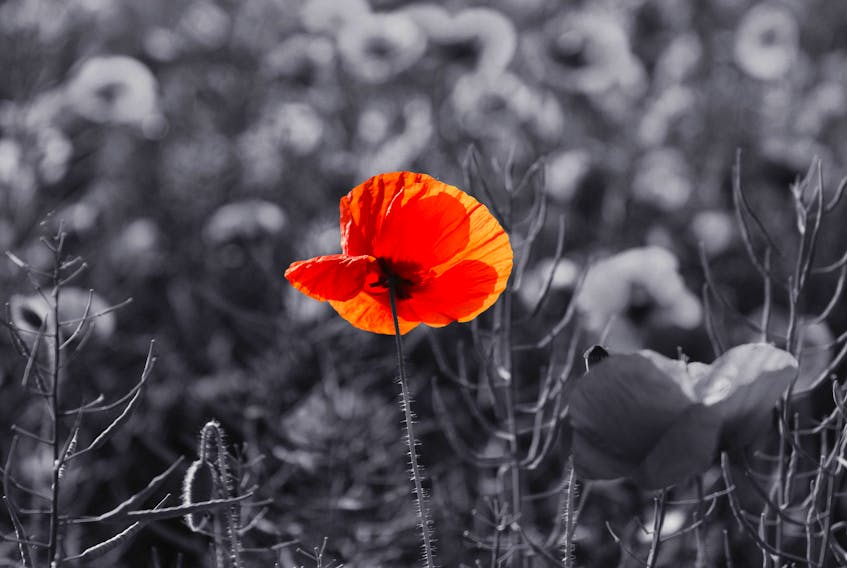“I’m sewn up neat in a canvas sheet
And I shan’t be home no more.”
— Charles Causley (1917-2003), Cornish poet, “Song of the Dying Gunner.”
That war divides us goes without saying, pitting nation against nation, people against people.
But I’m not just talking about the divisions created when countries choose sides.

War also divides us in peacetime. You have to tread carefully around the topic, even today. This is Remembrance Day, but it’s not observed nor viewed in the same way by everyone.
Some see war through a hazy lens of glory and nostalgia — King and Country, and all that; valiant battles fought, and rightly so.
Others find the very notion fills their mouths with bitterness — the human suffering, blood and mud and massive sacrifice, a generation of youth lured with propaganda that played to dreams of adventure and camaraderie.
“Your Chums are Fighting,” the First World War posters chided. “Why aren’t You?”
“You Said You Would Go When You Were Needed. You Are Needed Now!”
“Join Together. Train Together. Embark Together. Fight Together.”
(They could’ve rightly added “Die Together,” but I guess you wouldn’t get as many recruits with that slogan.)
The soldiers who were actually there, the women who supported those in battle and at home, well, they view war with a painful knowledge and familiarity many of us are fortunate enough not to have.
Lately I’ve been reading my well-thumbed copy of “The Terrible Rain: The War Poets 1939-45,” edited by Brian Gardner and originally published in 1966.
The poems were written by poets who were in the war — some killed in battle and some who returned. None were unscathed.
Who better to look to than the ones who were there; the ones who came to know with dreadful certainty that — as Pope Francis recently observed — war is “the destruction of ourselves.”
W.H. Auden, who took part in the Second World War and was a stretcher-bearer in the Spanish Civil War, writes:
“Yes we are going to suffer, now; the sky
Throbs like a feverish forehead; pain is real;”
In “Air Raid Across the Bay at Plymouth,” Stephen Spender puts it this way:
“In the fields the corn
Sways, with metallic clicks.
Man hammers nails in Man
High on his crucifix.”
These Second World War soldiers entered battle perhaps thinking they were better girded, psychologically at least, for what was to come, given that they had the First World War as reference. But they discovered that forewarned could never really be the same as forearmed, and many questioned the sense and justification of their mission.
In “Embarkation Song,” Geoffrey Matthews writes:
“I’m joking dear; and I shan’t ask what you’re doing
While I’m abroad, or how you wait.
But quick, tell me once more why I am going,
Before it is too late.”
You’d think that in the aftermath of the two World Wars and the many conflicts that followed, the shared experience and history and the knowledge of the horror would unite us, not drive us apart. Surely we can agree that war — no matter what propels it, no matter how noble seems the cause — always reaps a bitter crop of “hatred, death and vendetta,” as Pope Francis aptly noted.
I often wonder if the soldiers who have gone before — and in Canada, more volunteered than were conscripted — are heartened or disheartened that men and women are still willing to sign up for a Canadian Forces career that could send them deep into a conflict zone. It is important, dangerous, potentially soul-crushing work.
Perhaps our veterans are glad to see the torch taken up against injustice and inhumanity. Or perhaps they wish that no one had cause to. Don’t we all?
Keith Foottit writes:
“If love was set to music
And played at the Albert Hall,
Man would love his neighbour,
There’d be no war at all.”
Keith Foottit was born in India, educated in England, trained in the United States and wound up piloting a Halifax bomber. He and all his crew were killed when their plane was shot down over Magdeburg, Germany on Jan. 21, 1944. He was 21.
Pam Frampton is The Telegram’s associate managing editor. Email [email protected]. Twitter: pam_frampton









